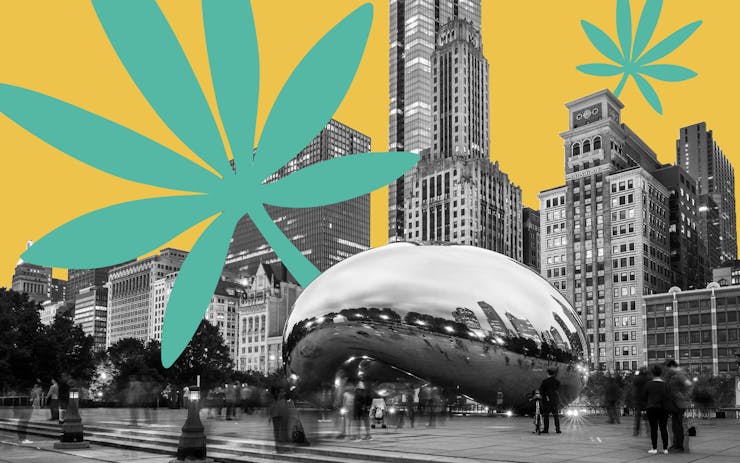The populous state of Illinois could become the 11th in the union to end its war on cannabis.
Gov. J.B. Pritzker introduced a 522-page bill Saturday into the Senate, which if passed would mean 12.74 million more Americans would get a modern, functioning cannabis marketplace. Here’s the details of Senate Bill 7:
- Adults 21 and over would get to carry 30 grams of cannabis, which is about a month’s supply
- Plus five grams of hash
- Plus 50 doses of edibles (500 mg THC at 10 mg per serving)
- Adult residents would also get to grow up to five plants, away from public view and locked up from anyone under age 21 in the house. Home growers can keep their harvests in excess of 30 grams on their property.
SB 7 also stands on the shoulders of past legalization efforts. It adds:
- Automatic expungement for low-level past offenses, and regular expungement for felonies
- $20 million in low-interest loans to disadvantaged operators (social equity applicants), such as those with prior marijuana felonies
- Illinois keeps its medical cannabis program, and medical stores get early approval for adult-use licenses
- A new grant program for impoverished neighborhoods
Legal Medical Cannabis—In Chicago? Yup, Find Windy City Stores on Leafly
Pritzker said in a statement, “From the outset, I made clear that any plan for adult use cannabis had to prioritize social justice and equity, and the approach we’re taking starts righting some historic wrongs and opening up access to this new market with a $20 million loan program that will help qualified applicants from impacted communities.”
The bill balances newfound freedoms with rules and taxes.
- You can’t be high at work
- Local cities can ban local stores, and most will
- Visitors can carry less herb that locals—a two week’s supply of pot, or 15 grams
- Taxes run 7% on gross receipts for growers, plus 10% state excise at the sales counter (25% for extracts)
- Plus—there’s local city (up to 3%) and county (up to .5%) excise taxes
- Commercial advertising would be banned near schools, on city buses, and could not contain pictures of marijuana leaves or cartoons
“This bill stems from an inclusive process that entailed community meetings, town halls, and legislative working groups,” said state Sen. Heather Steans. “In spite of having a wide variety of views, most of us wanted the same basic things – social justice, safety for our kids, and revenue for our state. I think we’ve done a good job of balancing these three goals.”
Gov. Pritzker announced the major step toward cannabis legalization Saturday, with Sen. Steans and others. The effort continues years of marijuana law reform that’s yielded results. Chicago and then statewide decriminalization have all but eradicated marijuana arrests in the city.
Marijuana arrests in Chicago fell from 21,000 a year in 2011, to 129 in 2017.
The head of the Illinois State Police, Acting Director Brendan Kelly, is also on board, stating his agency “will be a responsible partner in enforcing the law and ensuring any and all provisions of adult use legislation are strictly and efficiently complied with.”
Sixty-six percent of Illinois voters support legalization, according to a March poll conducted by Southern Illinois University Carbondale.
“Prohibition hasn’t worked. Today, we’re unveiling legislation that represents an important change in public policy, and it is long overdue,” said state Rep. Kelly Cassidy.





